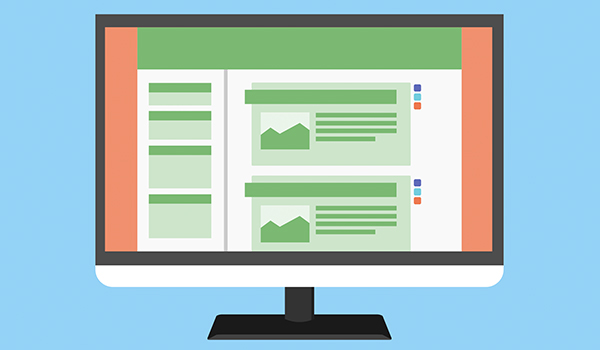So you’re going to take the plunge to a CMS. Maybe you want to get your feet wet with a blog or you’re redesigning a website.
Maybe it’s just time for an upgrade.
Odds are, you’ve probably heard of WordPress already.
But as you begin to look at content management systems, the sheer breadth of service providers can leave you reeling.
Open source or proprietary?
Self-managed or serviced?
Out of the box solution or custom-built?
These sorts of questions can quickly overwhelm even experienced content managers. So here’s a quick guide to know if WordPress is right for you and your organization.
WordPress & CMS Basics
Let’s get a better idea of what we’re talking about before we get into the evaluation stage.
CMS Basics
CMS stands for Content Management System. Without getting too far into it, CMSs are essentially systems that make it easy to store a website and edit it quickly without knowing very much (or any) code. They make it simple to create and publish content online for everything from blogs to e-commerce sites.

In general, people use CMS platforms for a few reasons:
- It’s easy to get started
- There are open source options, which means it can be low cost (or potentially free)
- They can be customized by a developer to do almost anything
- They enable non-technical people to publish quickly and easily.
There are many CMS platforms in the market, but a few of the most used are WordPress, Drupal, and Joomla.
WordPress currently has around 60% of the total market share. That means that for every 10 websites on the internet, 6 of them are built using WordPress.
The next largest ones are, as we mentioned, Drupal (6.6%) and Joomla (4.6%).
So WordPress has a high level of market domination.
WordPress basics
What is WordPress?
Technically, WordPress is a CMS based on PHP and SQL.
In layman’s terms, a website is a pile of data. SQL is a way to organize that data in the data center server, like organizing books in a library.

PHP is the language that’s used to go and get the right book when it’s requested. So, for instance, if someone loads your blog post, WordPress automatically uses PHP to go and find the right data (e.g. the words on the screen, any images, etc.) from the server where it’s stored in a SQL database (library) and bring it back and put it in the right place.
That’s the core of how WordPress works technically.
WordPress is also open source, which means that anyone can access the code and do whatever they want with it.
Open source does not mean free.
Open source means that anyone can take the code and essentially do whatever they want with it.
What this means is that companies can take the WordPress base code, modify it into a great product, and then sell the whole package. This is frequently done through WordPress “themes” like Thrive Themes and Avada.
WordPress has a couple other hallmarks with mentioning here:
- There is no “WordPress support.” Because it’s open source, it’s supported by dense community forum boards and knowledge bases.
- There’s a huge ecosystem of themes and plugins. Both paid and free plugins can be created to integrate easily with the WordPress platform. These allow a staggering amount of functionality.
- WordPress is a blank slate. Because the code can be used by anyone, WordPress is essentially a blank slate – it can be manipulated and changed to do whatever someone needs it to do.
Now that we’re on the same page, let’s get on with how you can know if WordPress is right for you.
Publishing needs
The primary benefit of WordPress is the fact that it’s simple to publish content.
- Multiple permissions make it easy to have managerial oversight of what’s going out the door
- Simple text editor enables people to publish content and rich media without any coding experience
- Multiple plugins make a great deal of additional functionality (JavaScript functions, dynamic content, SEO) available without any substantial coding.
Collectively, these benefits mean users can publish easily without having to worry about any technical details.
It also means that once a site is built, organizations don’t have to maintain significant internal development resources. Even an intermediate knowledge of HTML/CSS means that a substantial amount of functionality is available from within the WordPress environment itself – no need to work in something like Dreamweaver.
Finally, WordPress makes publishing rich content painless. Videos, images, quizzes, e-learning courses, and more can all be done through WordPress with no additional software required.
Cost
The second significant attraction to WordPress is cost. WordPress is open source. This means the underlying code can be used by anyone, for free. It also means that companies can build on top of it for free, and resell their products for less since they’re not covering high licensing fees too.
The result is you can get a superb site and all the tools to run it for very cheap or even free.
What’s more, you can tailor your cost exactly to your needs – for instance, if your functionality requirements are low but your support requirements are high, you can find a service provider who has that product/service combo.
Coding/development vs WYSIWYG editor
WordPress is designed to take the code out of running a website. This doesn’t quite happen but it comes pretty close.
First, there are themes that do most of the design and layout work for you.
Second, the built-in text editor means you can publish virtually any content without any code.
And finally, the vast array of plugins means that additional functionality can usually be deployed without any code.
Summary: 7 questions to see if WordPress is right for you
1. How often do I need to publish?
If the answer is “regularly” then WordPress is a great option. If you’re building a static website, then easy publishing is less important.
2. Are you using the website for e-commerce?
WordPress will work well for e-commerce – but there are other e-commerce-specific platforms like Shopify that might be worth considering as well. Particularly if you want to get something going quickly, there are easier ways than WordPress… but you do sacrifice scalability.
3. How much coding are you willing/able to do?
WordPress is designed to work without any coding experience. And this is true… sort of. Most WordPress installations need at least a vague idea of how coding works. Additionally, front-end design will require at least a working knowledge of HTML and CSS.

WordPress is great if you’re not a developer but you’re willing to learn. If you’re looking more for a true no-code experience, then WordPress might not be for you.
4. How important is flexibility?
The main benefit of being built on an open source platform and have a strong, active community is that WordPress can do anything you need it to. It can be a great e-commerce site, a blog, a portal, a new site – anything at all!
And with countless themes and plugins, there’s very little functionality that can’t be achieved.
Generally speaking, if you want this sort of flexibility, then WordPress is great. If you want your site to do one thing really, really well (e.g. sell products on Facebook) then other, specified platforms (where available) might be better.
5. What are your cost requirements?
WordPress is extremely cost effective to get a site up and running. Its open source core and the fact that it’s widely popular means that infrastructure costs are very low.
And the huge market has led to an influx of WordPress-specific developers who are capable of whipping up a site in no time, in turn driving down WordPress development costs.
That said, maintenance costs should be taken into account when selecting a CMS.
Wordpress regularly releases updates to its core with new features and security updates. Given the security issues associated with open source software, it’s recommended for you to update your core when new versions are available.

But if your site uses custom themes or plugins, there’s a chance they can break when you update. In this case, you will want a developer on-hand to test your site before installing any of these updates.
In short, getting a great site up and running can be done quickly and cost-effectively with Wordpress, but ongoing maintenance fees should not be overlooked.
6. What is the primary purpose of your website?
WordPress began as a blogging platform but has evolved to do much more than that.
Now, it’s been manipulated to do everything under the sun, but content-heavy sites are still its core area of expertise.
So if you’re cranking out content, using your site to drive leads, or have a lot of legacy content you need to organize online, then WordPress is great. If you’re creating a dedicated e-commerce site, then there are probably better solutions for you.
7. Do you rely on organic search to drive your business?
If you rely on organic search for your business, WordPress is a good option. Why? Because Google rewards regularly updated, clearly structured content. WordPress makes producing both of these things much easier. Plus, WordPress has a number of plugins to help keep your site search engine friendly.
Searching for WordPress development services?